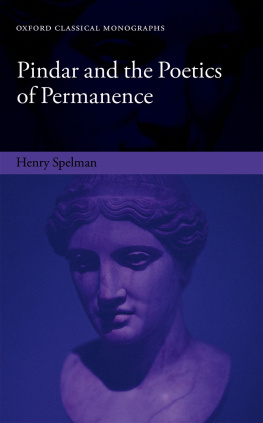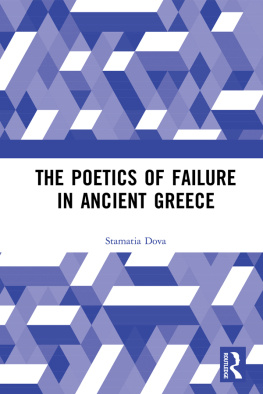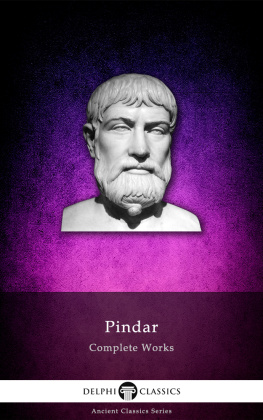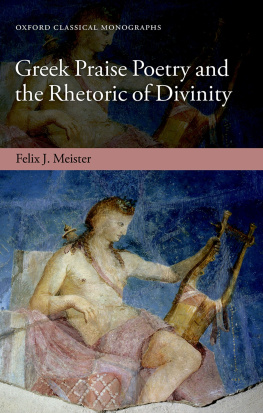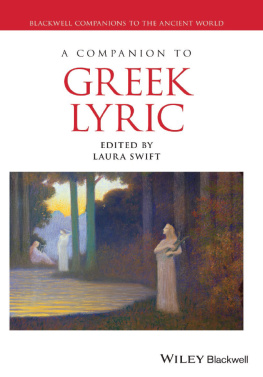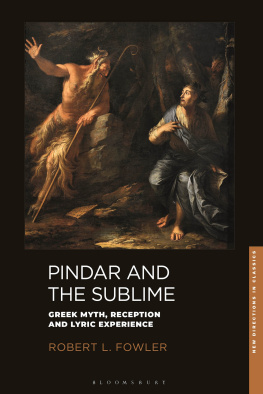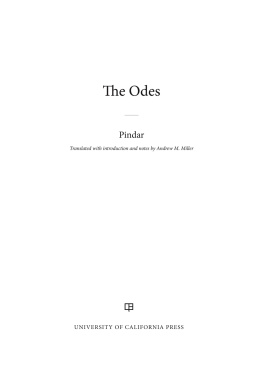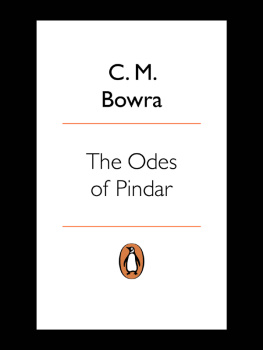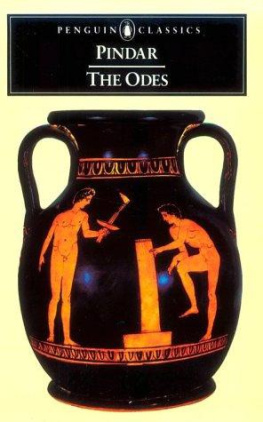Oxford Classical Monographs
Published under the supervision of a Committee of the
Faculty of Classics in the University of Oxford
The aim of the Oxford Classical Monographs series (which replaces the Oxford Classical and Philosophical Monographs) is to publish books based on the best theses on Greek and Latin literature, ancient history, and ancient philosophy examined by the Faculty Board of Classics.

Great Clarendon Street, Oxford, OX2 6DP, United Kingdom
Oxford University Press is a department of the University of Oxford. It furthers the University's objective of excellence in research, scholarship, and education by publishing worldwide. Oxford is a registered trade mark of Oxford University Press in the UK and in certain other countries
Henry L. Spelman 2018
The moral rights of the author have been asserted
First Edition published in 2018
Impression: 1
All rights reserved. No part of this publication may be reproduced, stored in a retrieval system, or transmitted, in any form or by any means, without the prior permission in writing of Oxford University Press, or as expressly permitted by law, by licence or under terms agreed with the appropriate reprographics rights organization. Enquiries concerning reproduction outside the scope of the above should be sent to the Rights Department, Oxford University Press, at the address above
You must not circulate this work in any other form and you must impose this same condition on any acquirer
Published in the United States of America by Oxford University Press 198 Madison Avenue, New York, NY 10016, United States of America
British Library Cataloguing in Publication Data
Data available
Library of Congress Control Number: 2017955475
ISBN 9780198821274
ebook ISBN 9780192554406
Printed and bound by CPI Group (UK) Ltd, Croydon, CR0 4YY
Links to third party websites are provided by Oxford in good faith and for information only. Oxford disclaims any responsibility for the materials contained in any third party website referenced in this work.
For my parents,J.H.S and R.L.S
Acknowledgements
If it takes a village to raise a child, it takes a lot more to produce a monograph about Pindar. This particular monograph represents a revised version of the first two parts of an Oxford DPhil thesis submitted in 2015. I am most grateful to the Rhodes Trust, Balliol College, Oxford, Magdalen College, Oxford, the Oxford classics faculty, and Christs College, Cambridge for the financial and institutional support that enabled me to enjoy the luxury of spending years thinking about ancient literature with a roof over my head and food in my stomach. In fact, the food was often excellent.
Patrick Lake patiently instructed me in the rudiments of Greekeven after my nose bled profusely over my first test, which I failed. Henry V. Bender taught me how to read a text and took my ideas seriously even when they did not deserve that. William H. Race once thought it worth three hours of his week to read through all of Pindar with a sophomore English major who wanted to do an independent study. He also read and commented on the doctoral thesis that eventually grew from those thrilling meetings and from the fascination with ancient poetry which they kindled in me. Patrick Finglass kindly agreed to supervise the first year of my doctorate at Oxford and has since continued to share his warm friendship and sage advice. My supervisor, Gregory Hutchinson, guided me along the road to submission with his singular insight, erudition, and good humour. Without him both this work and I myself would be very different and very much worse off. Douglas Cairns served as my external examiner and provided invaluable guidance in improving this work in preparation for publication. Felix Budelmann served as my internal examiner as well as a constant sounding board and source of inspiration in many senses. My advisor for the Oxford Classical Monographs Series, Angus Bowie, helped greatly to enhance the clarity and readability of the final text. Whatever blunders and infelicities remain therein by no means reflect on the generosity and wisdom of all those remarkable individuals who helped me to see it through to completion.
Sara VanDerBeeks Roman Woman I kept faithful watch over my desk throughout the last year of revision. I am grateful to the artist for permitting her work to be reproduced on the cover.
More purely personal debts, far too numerous to be recorded here, have been acknowledged elsewhere and in other ways. My deepest debt is acknowledged in the dedication.
Contents
Translations are my own. They aim at nothing more than giving a general sense of how I understand the Greek. All ancient names have been anglicized (thus Achilles rather than Akhilleus).
Abbreviations of ancient authors generally follow the Oxford Classical Dictionary4, but Bacchylides is abbreviated simply as B.. I refer to the Theognidea without taking a position on authenticity. Thus Thgn. and never [Thgn.].
| BNJ | Brills New Jacoby (http://referenceworks.brillonline.com/browse/brill-s-new-jacoby). |
| CA | J. U. Powell ed., Collectanea Alexandrina (Oxford 1925). |
| CEG | P. A. Hansen ed., Carmina Epigraphica Graeca, 2 vols. (Texte und Kommentare 12, 15; Berlin 19839). |
| Denniston | J. D. Denniston , The Greek Particles2, rev. K. J. Dover (Oxford 1954). |
| D-K | H. Diels ed., Die Fragmente der Vorsokratiker6, 3 vols., rev. W. Kranz (Berlin 19512). |
| FGE | D. L. Page ed., Further Greek Epigrams. Epigrams before ad 50 from The Greek Anthology and other sources not included in Hellenistic Epigrams or The Garland of Philip (Cambridge 1981). |
| FGrH | F. Jacoby et al. eds, Die Fragmente der griechischen Historiker (Leiden 1923). |
| Fowler | R. L. Fowler ed., Early Greek Mythography, 2 vols. (Oxford 200013). |
| GEF | M. L. West ed., Greek Epic Fragments (Cambridge, MA 2003). |
| GP | A. S. F. Gow and D. L. Page eds, The Greek Anthology. The Garland of Philip and some contemporary epigrams (Cambridge 1968). |
| HE | A. S. F. Gow and D. L. Page eds, The Greek Anthology. Hellenistic epigrams (Cambridge 1965). |
| LSJ9 | H. G. Liddell and R. Scott , A GreekEnglish Lexicon9, rev. H. Stuart-Jones et al. (Oxford 1940). |
| PCG | R. Kassel and C. F. L. Austin eds, Poetae Comici Graeci, 8 vols. to date (Berlin 1983). |
| PMG | D. L. Page ed., Poetae Melici Graeci (Oxford 1962, corrected reprint 1967). |
| Slater | W. J. Slater , Lexicon to Pindar (Berlin 1969). |
| SLG | D. L. Page ed., Supplementum lyricis Graecis. Poetarum lyricorum Graecorum fragmenta quae recens innotuerunt (Oxford 1974). |
| S-M | B. Snell and H. Maehler eds, Pindari Carmina cum Fragmentis, 2 vols. (Leipzig 19879). |
| TrGF | Tragicorum Graecorum Fragmenta. Vol. 1 Didascaliae Tragicae, Catalogi Tragicorum et Tragoediarum, Testimonia et Fragmenta Tragicorum Minorum (ed. B. Snell; Gttingen 19711, 19862); vol. 2 |

